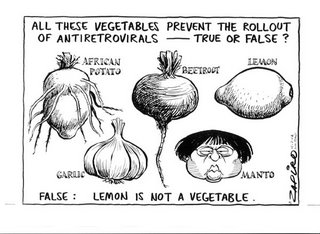Mario Conti, currently employed in senior management of the Catholic Church as an Archbishop declares in today's The Herald his allegiance to The Pope (the CEO equivalent of the organisation he is working for). His boss stated some time ago that we should not undertake destructive stem cell research (ie where stem cells are derived from the human embryonic cell mass, in the process of which the embryo is destroyed). The main reason given is that we should 'respect the dignity of each and every human being.' Of course, the accumulation of a few hundred cells (ie up to 14 days after conception) is cleverly and arguably question beggingly defined as a human being by the CEO and his senior management colleague in Glasgow.
Comes Mr Conti, saying that this kind of rhetoric is 'reason, not rhetoric... it is where I stand and where the Catholic Church stands.' Truly tempting to say Amen to that.
Rules of engagement: 1) You do not have to register to leave comments on this blog. 2) I do not respond to anonymous comments. 3) I reserve the right to delete defamatory, racist, sexist or anti-gay comments. 4) I delete advertisements that slip thru the google spam folder as I see fit.
Monday, July 31, 2006
Friday, July 28, 2006
George Michael on gay cruising
 George Michael is quoted as saying:
George Michael is quoted as saying:'I don't know anybody who actually goes to Hampstead Heath at two o'clock in the morning for anything other than the reason of playing about with another member of the human race. If they are there, then they are a little bit strange or they just don't know the local area. A very large part of the male population, gay or straight, totally understands the idea of anonymous and no-strings sex. The fact that I choose to do that on a warm night in the best cruising ground in London - which happens to be about half a mile from my home - I don't think would be that shocking to that many gay people.'
Fairly upfront statement... which then is followed by this...
'Until such time as the straight world is not attacking people for cruising, I'd say the gay world could actually keep that to themselves, just for a little bit longer.'
Looks a bit odd to say such a thing after making the statement quoted above... - Bit disingenious perhaps.
Talking about disingenious, the guy who claimed he had sex with Michael, offered these thoughts to the Daily Mail 'I admit I was there for sex. But I'm astonished a man as famous as George should even think about doing it. It's potentially so dangerous.'
I mean, if it is potentially so dangerous, why did he venture there in the first place?
Tuesday, July 25, 2006
Preparing for flu pandemic

The English Chief Medical Officer has published his 2005 report. The report contains a whole chapter on England's preparation for an upcoming flu pandemic. It addresses briefly the relevant isssues, such as limits on individual freedom of movement, allocation of scarce resources, and other such issues. The report strongly advises that there be a public discussion about the country's policy response to such a challenge. I am attending a panel discussion of biochemists tomorrow that will discuss the issue. Among the speakers is a regular contributor to the LANCET, a leading medical journal. A scientist will evaluate the likelihood of such a pandemic happening. It should be an interesting discussion. In case you're around, it's on Wednesday at 4 pm in the city's congress centre.
Sunday, July 23, 2006
Racism in the absence of races...

An East Asian lad was killed during racial upheaval in Preston, a truly dreadful town in the Northwest of the UK. People usually know Preston for its train station as many have to change trains there. Initially the Lancashire constabulary insisted that there was no evidence of a racial motive, but eventually corrected that claim. After all, that a fight between white kids and kids whose skin shows other colours would not be motivated by racism isn't overly plausible. The usual brawls between 'white' and 'ethnic minority' folks (or, in Birmingham, between Blacks and East Asians) does seem to know no end.
It is weird that in the absence of scientific evidence for distinct races, racism itself continues unabated, with dreadful consequences all over the world.
The 21st century this might be, but in evolutionary terms we have not done too well, or have we?
Friday, July 21, 2006
Bill's at it again

Bill Gates, one of the founders of Microsoft (the company controlling most of our computers), has announced that his charitable foundation will invest several hundred million US$ in the development of an AIDS vaccine. This has been lauded by some who are not usually among the fans of Gates and his company. Surely, from many vantage points Gates' initiative is laudable. Yet, some questions should reasonably be asked. For instance, if the same amount of money was poured into primary care and treatment of currently treatable illnesses killing millions of lives in developing countries, many lives could right now be preserved. Is his spending strategy the most efficient way to spend money in this area? Another question that can also reasonably be asked is this: what is this investment telling us about the lack of other players' investments (other developed countries, the international community) in major killer diseases prevalent amongst the world's poor? Is it a morally acceptable status quo that without major private donors no serious R&D investment dealing with such diseases would be available? Probably not.
Wednesday, July 19, 2006
Thoughtful bioethicist in the news
Check out this most readable piece about my good friend and colleague Richard Ashcroft. He is the Queen Mary Hospital, University of London's new biomedical ethics professor. Quite an indictment that the Imperial College's medical school, since his departure, has closed their bioethics unit altogether. Together with Glasgow University's medical school, it might well be one of only very few medical schools in the western world these days without serious biomedical ethics programme.
Monday, July 17, 2006
Clowning with Cloning
Not exactly a brilliant insight, but nontheless interesting. Social scientists in the UK and Austria interviewed genetic twins and discovered - surprise, surprise - that the twins developed different personalities. The researchers' conclusion: reproductive cloning would not result into cloned personalities. This surprising discovery was reported today on the BBC News website. Others noted similar things many years back, without generating the same media excitement. But then, hey, it's the mass media's silly season. Nothing much else is happening (well, the usual self-destructive wars in the Middle East continue).... so cloning is back in business.
Sunday, July 16, 2006
Saturday, July 15, 2006
World Congress of Bioethics

In case you have not booked your summer vacation yet and you fancy something a tad bit more unusual, you'd consider attending the World Congress of Bioethics held in Beijing, PR China from 06-09, 2006. The programme covers, as us usual, a mix of people presenting their government or otherwise sponsored bioethics activities in round-table discussions, as well as individual presentations by people able to pay their own way to the meeting.
Truth be told, it's a mixed bag of themes. There will be plenty more research ethics (US government funding for that kind of activity is probably at an all-time high, hence there's going to be plenty of forth and back on all sorts of matters research ethics). Thomas Pogge from Australia's CAPPE is organising a most interesting stream on issues surrounding drug R&D, the 10/90 gap, IPR and access to essential drugs. For those more high-tech inclined, no doubt there should be sufficient first worlders going on about nano-technologies, face transplants and other more or less esoteric technological frontier issues.
As always the Feminist Association of Bioethics, an official network of the IAB, will run a 3 day satellite conference prior to the main event. Attendance should be a must for anyone going to Beijjing. I have found often their offerings in the past more interesting and relevant than the main event.
Delegates will have a great opportunity to mingle with participants from most other parts of the world, and, hopefully with many Chinese delegates. Bioethics is growing in leaps and bounds in the PR of China and this Congress hopefully will provide a welcome boost to the development of the field in that country.
Find out more details here.
Bioethics, the journal I co-edit, will run, as always a special issue featuring some time in 2007 the best contributions form the Congress.
Thursday, July 13, 2006
Apology but no regret

A second posting in a row on soccer - anyone who knows me must think something has gone seriously wrong in my life. After all, a few weeks ago I would not have even known that the soccer world cup was on its way. - For better or worse I watched the final and saw Zinedine Zidane (left) headbutting Italian defender Marco Materazzi.
Since the incident Zidane declared that he considered his own behaviour 'inexcusable', and he considered it necessary to 'apologise', but not without adding that he nad no regrets. The Italian, he claimed, had uttered nasty insults about his mother and sister.
I would be the first to accept that the spoken word can be as hurtful (even more hurtful) than a headbutt, and that a dividing line between words and actions often isn't sensible. People can be driven into suicide simply by the word.
In any case, what really puzzles me about this episode is the idea that I could apologise to someone without regretting what I did. This seems impossible to me. An apology seems to require some sense of regret culminating into an apology to the offended/injured.
Tuesday, July 11, 2006
Different Realities - the soccer world according to the media

By pure coincidence I have been reading today two different news items, one from South Africa's Mail and Guardian (the country's only quality weekly news magazine) and one from Der Spiegel (Germany's only quality weekly news magazine). Both report about the upcoming FIFA soccer world cup in South Africa. Der Spiegel discusses the likelihood that South Africa might lose the world cup to another country because it's allegedly far behind schedule in terms of building the promised venues and other infrastructure required. Doubts have been raised with regard to the competence of the South African organising committee.
That's one reported reality then.
Another reported reality is that published in the Mail and Guardian today. Donwald Pressly reports that the main issue currently pre-occupying the sports ministry is legislation designed to ensure that the old South African flag (ie the apartheid state's flag) is proscribed during the soccer world cup. This probably is a kind of Quixotian activity, given that soccer in the country is a predominantly black kinda event. Whites tend to stick to other types of sports including rugby and golf.
If Der Spiegel is correct, of course, one has to wonder whether the country has its priorities right as far as the world cup is concerned. Whether a country with the type of social problems South Africa faces should invest into massive sports infrastructure developments such as those required to host the soccer world cup, is probably a question worth pondering.
Saturday, July 08, 2006
Age and Just Punishment

A variety of tinpot dictators have since been held accountable for their crimes. Some, like Chile's Mr Pinochet, will probably get away with murder and torture. Currently Mexico is witnessing a court case against Mr Echeverria (picture top left), a former President of the country. As it happens, Mr Echeverria was also Interior Minister at the time when PRI government agents shot at unarmed, protesting students. Mr Ignacio Carrillo is a special prosecutor filing charges against Mr Echeverria. No doubt, the former Interior Minister is innocent until proven guilty. While I have little doubt about his role in the student massacre, my views are neither here nor there by way of proof.
What is of interest to me is an entirely different issue. Mr Echeverria's legal team announced that even if he was found guilty he would not go to jail, because of his age (he is 83).
This is what puzzles me a bit. I could see why he might not be prosecuted and go to jail if his memory was failing, or his intellectual capacities were faulty, yet this is not the case made by his legal team. Rather they suggest that age as such is a sufficient reason to rule out prosecution and a jail sentence for someone found guilty of murder.
I wonder what their rationale for this proposition might be...
Thursday, July 06, 2006
Fundraising to feed AIDS orphans
 Let me tell you something about an AIDS charity worthy probably also of your support. It's a (really - trust me) community based project in Southern Africa. What they do, in a nutshell, is to try to keep AIDS orphans in some kind of family unit (most likely relatives or neighbours). In order to ease the burdens on those usually impoverished families, however, the initiative provides 2 meals per day per child through community based food kitchens. Phedisang's approach to the problem is two-fold: It aims to move as many of the kids it feeds as is feasible on to the state grants that these kids are entitled to (but that they would never receive if it wasn't for the logistical support from Phedisang). So, basically, the first step is to keep kids properly fed, the second step is to move them on to state support in order to free donor money for other children in similar need.
Let me tell you something about an AIDS charity worthy probably also of your support. It's a (really - trust me) community based project in Southern Africa. What they do, in a nutshell, is to try to keep AIDS orphans in some kind of family unit (most likely relatives or neighbours). In order to ease the burdens on those usually impoverished families, however, the initiative provides 2 meals per day per child through community based food kitchens. Phedisang's approach to the problem is two-fold: It aims to move as many of the kids it feeds as is feasible on to the state grants that these kids are entitled to (but that they would never receive if it wasn't for the logistical support from Phedisang). So, basically, the first step is to keep kids properly fed, the second step is to move them on to state support in order to free donor money for other children in similar need.To my mind it's a very clever system because it is sustainable in the longterm, because it's small and doesn't rely on massive administrative operations (gobbling up much of the donor money), and reassuringly, there are no overseas concultants on obscene international salaries that need to be 'fed', too. Check it out and consider supporting them!
Wednesday, July 05, 2006
Bioterrorism and Academic Freedom

We had an interesting speaker today at the Centre for Ethics in Public Policy and Corporate Governance. Mike Selgelid from the Australian National University spoke on the question of whether or not we can leave to scientists' self-regulation the types of issues that they may legitimately research about and publish on. His conclusion was that there are good reasons for government regulations of certain types of research that may be used for good as well as evil. We discussed the problem today on BBC Radio, and were joined by the Liberal Democrats spokesperson on the issue in the House of Lords.
Most interesting - to the interested observer - was certainly Selgelid's observation that many countries place tight restrictions on nuclear research, for obvious security reasons. Equally as obviously biochemical weapons today are capable of causing as much - if not more - damage than nuclear weapons, yet there seem precious little regulations of such research in place in most parts of the world.
Tuesday, July 04, 2006
Against Bioethics

'Against Bioethics' by Jonathan Baron is a book worth buying - probably a strange verdict, coming from one of the editors of Bioethics, you might think. The truth though, is that Baron is not actually against bioethics. His book provides an excellent exposition of how a utilitarian would approach particular issues in bioethics. Among the issues he covers are drug R&D, research allocation issues and similar topics of current concern. Baron is quite critical of deontological or principle based thinking that is fairly common in the field.
Peter Singer, on the book cover, 'Ignore the title. Baron doesn't want to get rid of bioethics, but to show us how we can do it better. His acute diagnosis of the pervasive errors of deontological approaches to bioethics deserves a wide readership.'
Nuff said, buy and read this book. While you read chapter 8, have in mind that there are good consequentialist arguments against placebo controls even in countries where people have no alternative acess to life extending drugs. This is the only part of the book that I found disappointing. Disappointing not because I disagree with Baron - I do, very strongly so - disappointing because he chose to ignore widely available (ie PubMed listed articles) consquentialist arguments in favour of criticising not so sophisticated deontological arguments put forward by the that time Editor of the New England Journal of Medicine, Marcia Angell.
Another great book in the MIT Press's series 'Basic Bioethics'. The field ought to be grateful to Glenn McGee and Art Caplan for continuing to choose challenging topics for inclusion in their series.
Monday, July 03, 2006
AIDS tonic promoter suspended by University of Cape Town

South Africa's papers report today that a herbal tonic promoted by Girish Kotwal, a senior biomedical scientist at the University of Cape Town may have led to deaths of patients who stopped simultaneously taking their antiretroviral drugs. The university suspended the scientist in question. The university reportedly stated that 'the remedy had not been properly tested for safety and efficacy and the limited patient research conducted had not been approved by the university'. The potion sells in South African shops for about 200 ZAR (a bit less than 20 GBP), and according to the newspaper reports the university earns royalties from its sale.
Kotwal organised a conference on traditional African remedies in the end of 2005 that attracted - unsurprisingly to South African observers, the South African health minister Manto Tshabalala-Msimang, who stated the following: It provides an opportunity to reclaim our scientific and socio-cultural heritage, which was stigmatised and discredited as primitive rituals and witchcraft during many years of colonialism and apartheid ... This forum should expose the false dichotomy that had arisen between natural medicine and allopathic medicine, a division fostered by the need to make money from patented drugs through discrediting the use of natural products. Of course, as usual with Russia trained doctor Tshabalala-Msimang, she got it ever so slightly wrong. The issue has nothing whatsoever to do with patents but with drugs that have been tested in methodologically sound scientific clinical trials vs concoctions the supposed efficacy relies on hear-say. Nothing would prevent anyone from running clinical trials with any number of traditional African concoctions. Those that pass succcessfully the hurdles of phase 1 to 3 clinical trials would eventually get patented and join the ranks of other clinical proven medicines. Tshabalala-Msimang's African nationalism (again) readily sacrifices the survival interests of African people for the sake of a cheap propaganda exercise. - What's new you might ask. Very little indeed.
Update: 05 July 2006: Here are further details about the case from the Cape Times newspaper, including statements about the negative health consequences AIDS patients suffered who took the potion Kotwal advertised, as well as some verbatim comments from Nature, the leading science journal that first broke the story.
Saturday, July 01, 2006
US Supreme Court Justice

The conservative dominated US Supreme Court is working hard to redefine the meaning of justice, and mental competence. In a recent verdict (Clark vs Arizona, June 30, 2006) a 17 year old paranoid schizophrenic who believed that aliens from outerspace were after him to kill him, killed a police officer, believing that the officer was one such alien. Both defence and prosecution agreed on his psychosis and the nature of his delusions, yet he was denied the right to enter information about his mental illness in order to support his insanity defence. After much forth and back (ie lower courts) the US Supreme Court ruled that psychiatrists' evidence was indeed inadmissible because it could not be relied upon to make accurate and noncontroversial diagnoses of mental illness or evaluations of capacity. The Supreme Court practically denied psychiatrists' capacity to provide reliable judgments on the question of whether a defendant had mens rea at the time of the crime.
This is quite remarkable obviously, as it suggests that the medically untrained Supreme Court judges made judgments on a profession that isn't their own, in this case psychiatry. While it may or may not be true that psychiatrists' judgments cannot be relied upon, surely the members of the US Supreme Court are not qualified themselves to decide this issue one way or another.
Subscribe to:
Posts (Atom)
Ethical Progress on the Abortion Care Frontiers on the African Continent
The Supreme Court of the United States of America has overridden 50 years of legal precedent and reversed constitutional protections [i] fo...
-
The Canadian Society of Transplantation tells on its website a story that is a mirror image of what is happening all over the w...
-
The Supreme Court of the United States of America has overridden 50 years of legal precedent and reversed constitutional protections [i] fo...
-
Canada’s parliament is reviewing its MAiD (medical assistance in dying) legislation. This is because there were some issues left to be a...